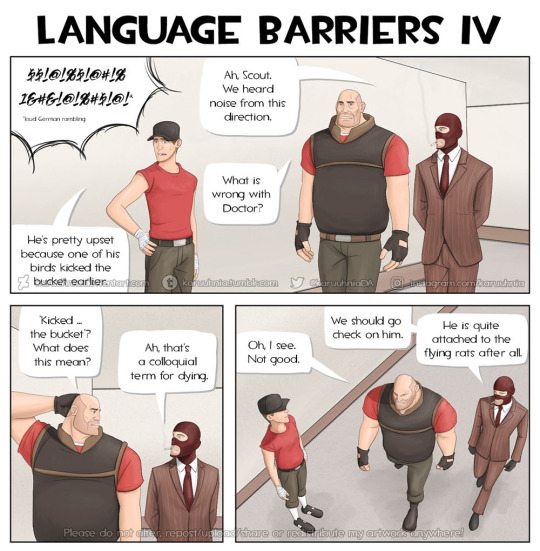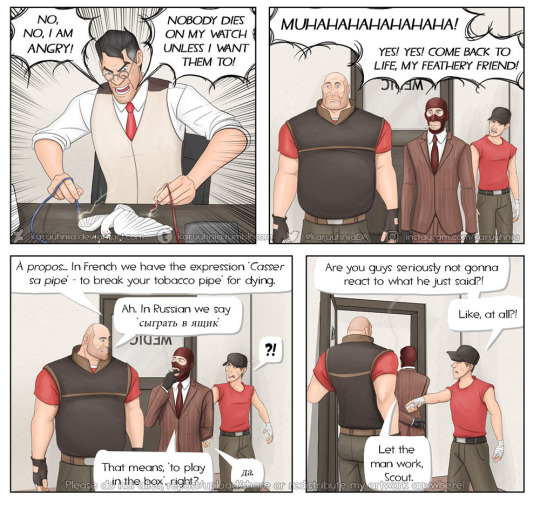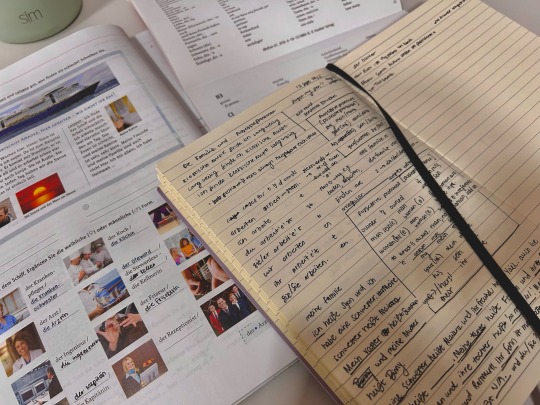#German language
Text
In my L1-acquisition class two weeks ago, our professor talked about how only 9% of the speech a baby hears is single words. Everything else is phrases and sentences, onslaughts of words and meaning!
Thus, a baby not only has to learn words and their meanings but also learn to segment lots of sounds INTO words. Doyouwantalittlemoresoupyesyoudoyoucutie. Damn.
When she talked about HOW babies learn to segment words our professor said, and I love it, "babies are little statisticians" because when listening to all the sounds, they start understanding what sound is likely to come after another vs which is not.
After discussing lots of experiments done with babies, our professor added something that I already knew somewhere in my brain but didn't know I know: All this knowledge is helpful when learning an L2 as well:
Listen to natives speaking their language. Original speed. Whatever speaker. Whatever topic.
It is NOT about understanding meaning. It is about learning the rhythm of the language, getting a feeling for its sound, the combination of sounds, the melody and the pronunciation.
Just how babies have to learn to identify single words within waves of sounds, so do adults learning a language. It will help immensely with later (more intentional) listening because you're already used to the sound, can already get into the groove of the languge.
Be as brave as a baby.
You don't even have to pay special attention. Just bathe in the sound of your target language. You'll soak it up without even noticing.
#this is not “learn a language while you sleep”#but it is similarly easy#german#langblr#deutsch#learning german#language learning#deutsch lernen#german language#german learning#german vocabulary#language
3K notes
·
View notes
Text
a german woman who's a scammer call her a fräudlein
#german language#german#linguistics#shitpost#joke#funny#germany#pun#queue are lovely#language#languages#duolingo#langblr#jokrd#jokes
2K notes
·
View notes
Text



... ... So anyway, what do you say for "kick the bucket" in your native language?
In German we say "den Löffel abgeben" (= "to turn in/hand over the spoon") or "ins Gras beißen" (= "to bite the grass") among other things.
_______
Please do not alter, repost/reupload or redistribute my artwork anywhere! (Reblogging is perfectly fine, of course.)
1K notes
·
View notes
Text
König: Self-care is for the schwach! (weak!)
You: *coughs*
König: Scheiße! We need ambulance!
#incorrect cod quotes#incorrect konig quotes#you x konig#konig x reader#witch the writer's headcanons#witchthewriter#headcanons#call of duty headcanons#cod headcanons#konig headcanons#relationship headcanons#headcanon#german language#god i hope i got the language right
256 notes
·
View notes
Text

This is the morst german thing I (a german living in germany) have read in months and it's coming from tumblr 💀
[Transl.: Holy crap (literal: holy straw bag)! You've reached 100k likes!]
229 notes
·
View notes
Text
How to build a language self-study plan

So I’ve noticed, upon combing through pages and pages of youtube videos and google blogs, that rarely does anyone ever actually tell you what you should be studying. There’s a reason for this ! Everyone is different and at a different level, different motivation. It’s impossible to create a study plan that is perfect for everyone... which is why it can also be agonizing to make one for yourself.
“How am I supposed to know what’s important to study, if I don’t speak the language?”
Well that’s a good question! You need to gauge how far you’ve come so far and how far you’d like to get. It’s easiest when you are starting from zero because you can learn the alphabet, numbers, basic phrases, and basic grammar. Easy peasy. You can go cover to cover in a text book.
Here’s a check-list to create the perfect study plan special to you.
1. What do I know already? What do I need to work on?
- is it worth starting a textbook, if you feel like you already know half of it? It might be worth completing the given exercises and if you achieve an 80% or higher (or you could give that lesson to someone else) then you can move on from that specific point.
- create a list of the points that you still need to master
2. What do I need to include in a study session?
- naturally there needs to be a focus or a few different focuses of a study session, whether it’s a specific activity or a grammar point. I recommend creating a list of things you want to get done (a.) every day, (b) every week, and (c) every month. These goals must be quantifiable. For example, every week I read two news articles in German. As a reflection, I then write a summary of the event of the article as well as a personal opinion. That’s an easy box to check.
- you need a reflection. It’s important to really take time to reflect on how you feel about the time spent and the materials used. What could you do better next time? What went well?
3. When is the best time to study?
- are you more active/focused in the morning or in the night? The key is consistency. If you have a routine, you’re far more likely to adhere to it. I know that my own schedule is highly changeable and that can make it very difficult, but I’ve found if I wake up in the same period of time every morning, brush my teeth, make my bed, and then sit down to my work, I feel far more productive.
- how much should I study at a time? The recommended period is 25 minutes from the Pomodoro Method with a five minute break. You can research time-management techniques but ultimately it comes down to you.
4. How do I take notes ?
- IT”S ALL ABOUT YOU! What I do is take messy notes in classes or on my own and then I transcribe the finished page to my Notion page. It gives me a chance to make the notes neater and also to review a little bit. I will say though statistically, you will remember better if you write by hand.
- I like to have a column on each page for words I didn’t know
#languages#language learning#German language#french language#langblr#langblog#russian langblr#german langblr#french langblr#learn languages
1K notes
·
View notes
Text
Learning German & Staying alive
☄ https://german.net/ - free online resource with some tests, text, and planty more. Great for reading and reading comprehention;
☄ https://germanwithlaura.com - great course that explains grammar a bit more manageable;
☄ https://www.clozemaster.com - somewhat of a duolingo-copy, gamification at ift greatest. From 100 to 50 000 common words in context, can be used for free;
☄ https://wunderdeutsch.com/uk/grammatik-null-u/ - grammar, but in ukrainian. Helpful;
☄ https://golernen.com/ - more grammar, with ukrainian language avaliable;
☄ https://piracywhiskeypoetry.tumblr.com/post/136460408137/language-resources-masterpost - masterpost with multiple language;
☄ https://mein-deutschbuch.de/grammatik.html - another damn grammar
☄ https://www.quia.com/web - tests, some fun stuff.
sheesh I would need to make it pretty, but for now will do
445 notes
·
View notes
Text
Some funny German words that are kind of hard to translate that are also not from the lexicon of obscure sorrows:
- Eigenart, Die. (Noun) Lit: the own-kind, meaning: Quirk
Usage example: "Ach, das ist dem seine Eigenart." (Oh, that's his quirk)
- Verschlimmbessern. (Verb) Lit: Worse-improving, meaning: trying to make something better, but making it worse in the process
Usage example: "Verschlimmbessern kann der gut." (He's great at making things worse while trying to make them better.)
- Sturmfrei. (Adjective) Lit: Storm free, meaning: having the house to yourself because your parents are away
Usage example: "Ich hab das ganze Wochenende sturmfrei." (I have the house to myself the whole weekend)
- Ohrwurm, Der. (Noun) Lit: Ear Worm, meaning: a song you can't get out of your head
Usage example: "Das Lied ist seit drei Tagen mein Ohrwurm." (That song has been playing on repeat in my head for three days)
- Schnapsidee, Die. (Noun) Lit: alcohol idea, meaning: An idea so stupid it could only have come from someone drunk.
Usage example: "Du weißt schon, dass das 'ne Schnapsidee ist?" (You do know that this is a stupid idea?)
- Treppenwitz, Der. (Noun) Lit: Staircase joke, meaning: coming up with a perfect reply for a joke or argument too late for it to be any use
Usage example: "Ich hätte in der Prüfung viel besser sein können, wenn mir die besten Ideen nicht erst als Treppenwitze gekommen wären." (I could have been much better in the exam if I hadn't thought of my best ideas afterwards while on the stairs.)
305 notes
·
View notes
Text
RAH RAH RAH RAH PEOPLE WHO SPEAK/WANT TO LEARN GERMAN AND LIKE THE HOBBIT BOOK. LISTEN TO ME
ARD (THE GERMAN EQUIVALENT TO THE BBC) HAS AN AUDIO BOOK OF THE HOBBIT ONLINE. AND YOU CAN DOWNLOAD IT!
BUT ONLY UNTIL JANUARY 24TH, AFTER THAT THEY'RE TAKING IT DOWN
#langblr#German#German language#the hobbit#learning German#I'M PUTTING THE LINK IN A RE LOG#German langblr
176 notes
·
View notes
Text
Does anyone have any fave German listening material for immersion?
I'm aware of EasyGerman on YouTube and various programs aimed at learners, but I'm looking more for TV shows, YouTube series, or streamers. Podcasts are fine too.
#i will kiss u on the forehead if you have good recs#gonna restart German at lightspeed like a clown#langblr#german langblr#german language#learning german
189 notes
·
View notes
Text
I think, broken down to its essence, learning a language can have three stages/goals, which can but needn't all be reached:
- Goal 1: have enough vocab and grammar to say stuff and have your message be understood
- Goal 2: have the grammar and vocab to say grammatically correct sentences
- Goal 3: be able to do creative/academic writing (meaning: have the skill+vocab to vary writing style according to the text type)
#this is probably also part of where that fluency discourse comes from#(besides fluency being super subjective in general)#because: is goal 2 already fluent?#or do you need the versatility of goal 3 to really consider yourself fluent?#german#langblr#deutsch#learning german#language learning#deutsch lernen#german language#german learning#language#german vocabulary
196 notes
·
View notes
Text
The Duolingo blog has given me my new absolute favourite German word:
das Kopfkino

#langblr#language learning#learning languages#german language#learning german#germanblr#linguistics#duolingo#duolingo german#my posts
154 notes
·
View notes
Text
"why does this word mean multiple things in this language" vs. "why can't i use this word for all these different contexts it's so much more simple that way"
#me @ the word “at” in english#i've been taking it for granted this entire time not realizing how many different contexts it's used in#vs german where there's like. 5#um in im zu bei#probably more#not faulting german for this but damn i thought 'at' was simple#random rambling#german#deutsch#learning german#learning languages#language learning#linguistics#language#languages#langblr#language memes#linguistics memes#english language#german language
239 notes
·
View notes
Photo

Countries where German is the official language.
by languages.eu
German is a West Germanic language mainly spoken in Western Europe and Central Europe.
It is the most widely spoken and official or co-official language in Germany, Austria, Switzerland, Liechtenstein, and the Italian province of South Tyrol. It is also an official language of Luxembourg and Belgium, as well as a recognized national language in Namibia.
Outside Germany, it is also spoken by German communities in France (Alsace), Czech Republic (North Bohemia), Poland (Upper Silesia), Slovakia (Košice Region, Spiš, and Hauerland), and Hungary (Sopron).
157 notes
·
View notes
Text

tuesday 12/09/23
second day of class! it was so fun!! covered professions today and it was awesome
♫ the spins - mac miller ♫
#studyblr#studyspo#study aesthetic#studyinspo#study blog#study motivation#study hard#study vibes#study inspiration#german language#german language studies#learning german#learning language#learning languages#language#study study study#study abroad#studystudystudy#poc dark academia#academia aesthetic#romantic academia#dark academia aesthetic#light academia#classic academia#stem academia#soft academia#light academia aesthetic#chaotic academia
236 notes
·
View notes
Text
A fun detail from the German DISCO ELYSIUM translation!

Harry uses the polite pronoun "Sie" to address Kim, in combination with his first name. "Sie" (always capitalised) is a respectful form of "you", instead of "du", similar to French and Spanish having two "yous" (tu/vous and tú/usted). Normally, you would use "Sie" with someone's last name, to use formal speech and be respectful. Kim does so, he is being polite.
However, Harry using "Sie" together with Kim's first name is an unusual combination, and actually has a name: the "Hamburger Sie". (The city of Hamburg in the north of Germany, not the food).
"The Hamburger Sie" is a form of address in the German language in which you call someone by their first name and then use the polite form of address (example: "Frank, could you (formal) come here, please?").
It represents a middle ground for communication situations in which, on the one hand, people are not familiar enough to address each other by their first names and, on the other hand, addressing someone by their last name is perceived as too distant."
NOT ONLY is this an amazing way of showing Harry and Kim's relationship with pronoun use alone, but also gives Harry some additional characterisation:
he is a Northern lad, and expresses himself with a mix of formal/informal speech, but which is an expression of his upbringing and hometown - as well as his own way of carefully approaching Kim: Wanting to be familiar with him, but not wanting to be too head-on.
bless these translators, more to follow, I love this translation
#disco elysium#harry du bois#kim kitsuragi#german disco elysium#fun with translation#kimharry#german language#these lads just live rentfree in my head
875 notes
·
View notes